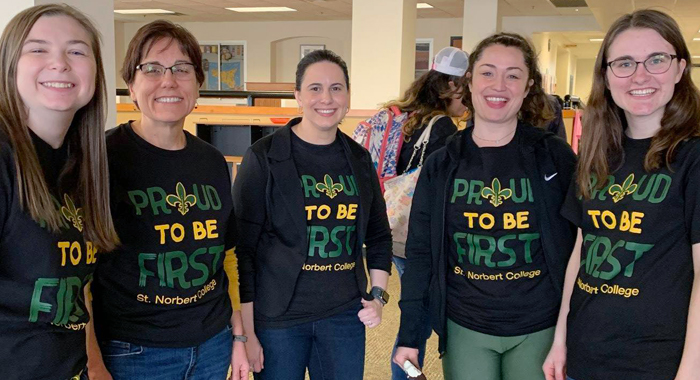Student-Led Proud to Be First Initiative Celebrates the First-Generation College Experience
Elisha Jaeke ’20 is passionate about helping first-generation college students walk the stage to receive a diploma.
First-generation students, or those who are the first in their family to attend college, typically face uphill battles to successfully earn a college degree, she says. Finances are often a challenge, or they might not know how to navigate scheduling, administrative offices or class schedules. They may feel they don’t belong, and often they are afraid to speak up if they feel lost on their college campus. Many may drop out.
Jaeke had such strong feelings about the issue that she helped co-found the Proud to Be First initiative, designed to give first-generation students support to stick through school. She launched the program with an innovaion grant from the college after being nominated for the national Newman Civic Fellowship as a St. Norbert College representative.
“First-generation is something I care deeply about,” she says. “Continuing education is something that’s so important to me.” Only about 72 percent of first-generation college prospects enroll in higher education, she says – and only about half of those will graduate.
“They have imposter syndrome,” says Jaeke, who is a first-generation student herself. “That’s something I have experienced. You just feel like maybe you don’t belong.”
The idea behind Proud to Be First, she says, is to create outreach opportunities for first-gen students to meet with each other, as well as with school faculty and staff. Jaeke worked with Avery Garcia (Multicultural Student Services) to get the grant to launch the program. Their efforts included two Coffee & Conversation meetings for students and staff.
“I think it’s important for staff and professors to come out and tell students they also are first-generation or to reach out to them,” Jaeke says. “First-gen students are a hidden population because they often won’t say anything or come forward.”
About one in four St. Norbert students are first-gen, she says.
“If you don’t have family or someone to help you, just navigating college can be confusing,” Jaeke says. “The dialect is confusing. You’re expected to navigate these different offices, like the bursar. What is that? I think the knowledge gap is bigger than people anticipated.”
Garcia says she was eager to work with Jaeke on the program. She sees that faculty and staff tend to think students will reach out to them, but that is often not the case.
“New students may see office hours posted on a professor’s door, for example, and think, ‘Oh, those are the hours they have things to do and don’t want to be disturbed,’ ” Garcia says.
She’s dedicated to helping Jaeke expand the program, and Jaeke has big ideas. She’d like to specifically target and seek out first-gen students to make sure they feel supported or to ask ways they might need help. She’d like to reach out to alumni who were first-gen students to work as mentors for first-gen students making their way through St. Norbert.
Because finances can be an issue for first-gen students, she would like to learn more about jobs on campus or scholarships available for travel abroad.
“I hope we can find the resources necessary to make this happen,” Jaeke says. “But first we need to identify first-gen students. It’s hard to target the resources they need if we don’t know who they are.”
Carol Bruess ’90, wife of President Brian Bruess ’90 and resident scholar at the Cassandra Voss Center, was a first-generation student herself.
“It’s essential that colleges and universities thoughtfully and intentionally support first-gen students because we know it can make a significant difference in their likelihood to thrive, flourish and succeed while in college,” she says. “There is a large body of research providing robust evidence about how first-generation programs can make such a difference, one of those being helping students articulate and ask question about the things they didn’t know that they didn’t know! When we help students be proud about being first in their families to go to college, we are helping them gain access to resources they often didn’t know exist, as well as helping them connect with others – peers, faculty, staff – who have similar identities and who can provide mentoring specific to their needs.”
She praised Jaeke’s efforts.
“Elisha is a brilliant and highly motivated student leader, and she brings the belief that when you see a problem or a need you can create systems-level changes to address that need and, in doing so, help not only current students but also future generations of students to have a better experience.”
As for her part, Jaeke says the program already has exceeded her expectations. She’s also seen the difference a helping hand can make to first-gen students on a personal basis.
“My sister is a first-gen student here,” she says. “I can see by having people reach out and help her, it’s so much easier for her to navigate the college system than it was for me. At times, I felt like I didn’t belong when I first arrived at St. Norbert. I think her experience will be completely different.”
June 4, 2019












